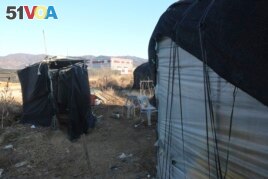07 March 2021
In December, a 31-year-old Cambodian worker died at a farm near Pocheon, South Korea. The woman's death led to criticism of South Korea's foreign worker policies. The government has promised reforms, but it is unclear what will change.
Visit to Pocheon
More than two months after Nuon Sokkheng's death, South Korea announced this week plans to improve the situation for foreign or migrant farm workers. The plans include increased chances for health care. But officials chose not to ban the use of shipping containers to house workers after strong opposition from farmers.
Kim Dal-sung is a pastor and supporter of migrant workers' rights. But when he visited farms near Pocheon with Associated Press reporters, he described the area as "a world of lawlessness."
Kim is an unwelcome visitor to the area, especially after Sokkheng was found dead on December 20 inside a poorly heated shelter at one of the farms.
"Farm owners here are like absolute monarchs ruling over migrant workers," Kim said. "Some say they want to kill me."

FILE An outdoor toilet, left, is placed beside a dormitory for migrant workers at a farm in Pocheon, South Korea on Feb. 8, 2021. Workers often are crammed in shipping containers or flimsy, poorly ventilated huts. (AP Photo/Ahn Young-joon)
One Korean farmer followed visiting reporters to prevent his foreign employees from talking to them.
Another shouted and waved her hand, stopping an interview with two Cambodian workers who went back into a shipping container.
"Who are you to come here?" the woman farm owner asked angrily. "Do you even know what farming is really like?"
Foreign workers and Korean farmers
There are around 20,000 Asian migrant workers legally working on South Korean farms, mostly from Cambodia, Thailand, Vietnam, Indonesia and Nepal. They were brought in under the country's Employment Permit System (EPS). To keep out illegal immigrants, the system makes it extremely difficult for workers to leave their employers, even when they are severely overworked or treated badly.
South Korean farmers, too, are suffering. The industry is facing difficulties after many years of labor shortages and increasing foreign competition. In an effort to survive, some farmers bring in workers for long hours and low pay.
Shin Hyun-yoo is the leader of a farmers' group in Gyeonggi Province, where Pocheon is located.
"Our farming communities are badly aged," Shin said. "Many will collapse if it becomes harder to hire foreign workers."
Activists and workers say migrant workers in Pocheon work 10-15 hours a day, with only two Saturdays off per month. They earn around $1,300-1,600 per month, well below the legally required pay their financial agreements are supposed to guarantee.
Just 10 percent of the 200,000 workers brought to South Korea under its EPS program work on farms. About eight in 10 EPS workers are employed in factories, while the rest work in the service industry or other kinds of jobs.
The Labor Ministry told a lawmaker in October that 90 to 114 EPS workers died each year from 2017 to 2019.
Ven. Linsaro is a Cambodian Buddhist monk based in South Korea. He assists with funerals and helps get remains sent back to families in Cambodia. Linsaro said he knew of at least 19 Cambodian workers who died in 2020. So far in 2021, one farm worker and another worker were found dead in their shelters.
"Most of them are in their 20s and 30s ... Many of them just died in their sleep," Linsaro said. He wonders if serious health problems are going untreated because many workers do not receive good health care.
I'm John Russell.
Kim Tong-Hyung reported on this story for the Associated Press. John Russell adapted it for Learning English. Bryan Lynn was the editor.
_____________________________________________________________
Words in This Story
pastor – n. a minister or priest in charge of a church or parish
absolute – adj. having unlimited power
monarch – n. a person (such as a king or queen) who rules a kingdom or empire
interview – n. a meeting between a news reporter and another person or people to gain information
shortage – n. a state in which there is not enough of something that is needed